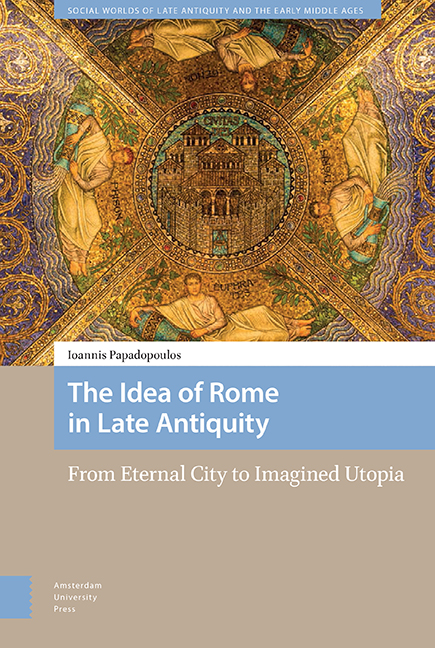Book contents
- Frontmatter
- Dedication
- Contents
- Introduction: Between a Physical and an Imaginary City
- I Looking Backwards: Ordo Renascendi
- II The Adventus of Constantius
- III Between Rome and Athens: The Artificial Romanitas of Julian
- IV Between the Altar and the Court: Symmachus and Claudian in Action
- V Between Christ and a Roman Place: The Emergence of Christian Rome in Time and Space
- VI Between Jerusalem and Babylon: The Archetype of Rome in the City of God
- Conclusions: From Rome to Eternity
- Bibliography
- Index
IV - Between the Altar and the Court: Symmachus and Claudian in Action
Published online by Cambridge University Press: 11 November 2021
- Frontmatter
- Dedication
- Contents
- Introduction: Between a Physical and an Imaginary City
- I Looking Backwards: Ordo Renascendi
- II The Adventus of Constantius
- III Between Rome and Athens: The Artificial Romanitas of Julian
- IV Between the Altar and the Court: Symmachus and Claudian in Action
- V Between Christ and a Roman Place: The Emergence of Christian Rome in Time and Space
- VI Between Jerusalem and Babylon: The Archetype of Rome in the City of God
- Conclusions: From Rome to Eternity
- Bibliography
- Index
Summary
The privileged position of Rome in the late Roman imaginary, and in particular its imprint as a collectively inherited, unconscious idea and element of self-definition of the senatorial elite, was significantly linked to the treating and management of the eternal city as the archetype locus of the Romanitas. The aristocrats were always fully aware of the importance of Rome but by the late fourth century, different elite groups with diverse religious affiliations were questioning the orientation of the symbolic landscape of their city. The established multicultural and religiously multidimensional profile of the city no longer matched the religious tastes of (some proportion of) the senatorial elite, which gradually raised an issue regarding the emphasis on certain traditional features of the urban landscape such as public ancestral rituals. In contrast to the traditional historiography however, there was no debate or clash of religions about the Altar of Victory or the funding of the old rites. Decades of academic studies portrayed the issue as a debate between Ambrose and Symmachus in ‘dramatic’ tones, even concluding that it was the last ‘battle’ of traditional paganism against Christianity. If there was any kind of confrontation it was the occasional competition of influences between different aristocratic networks, with complicated connections to the court and to each other, in order to balance the outcome of imperial policies that could be altered at anytime since the emperor was exposed to different opinion-makers in his environment. These decisions could hardly be traced to the contemporaries outside these aristocratic networks, yet their consequences were of paramount importance for the evolution of the Roman identity in the years to come.
During the active years of Symmachus, the issue at stake was the extent to which the city's public rituals were an indispensable aspect of Romanitas, linked directly to the devotio to the mos maiorum and the symbolic legacy of the city as an imperial capital. Faced with the emergence of a new (Christian) concept of Romanitas characterized by the absence of any pagan elements, certain members of senatorial families had to redefine their cultural identity and re-interpret traditional values so that their lifestyle and the symbols they adorned would survive in the future. For Symmachus's generation, however, this issue was both a dilemma and a challenge; to what extent could the Roman identity survive without the traditional cults?
- Type
- Chapter
- Information
- The Idea of Rome in Late AntiquityFrom Eternal City to Imagined Utopia, pp. 107 - 150Publisher: Amsterdam University PressPrint publication year: 2021



